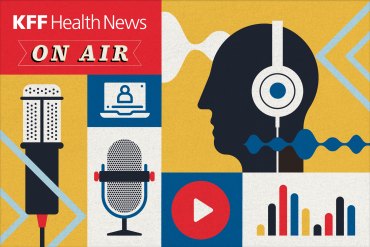Se cancelan clínicas de vacunación por recortes federales, mientras aumentan los casos de sarampión
Los esfuerzos de inmunización en todo el país se vieron afectados después que los Centros para el Control y Prevención de Enfermedades cancelaran abruptamente $11.400 millones en fondos relacionados con covid-19 que se usaban para muchas vacunas.
Slashed Federal Funding Cancels Vaccine Clinics Amid Measles Surge
Federal funding cuts, though temporarily blocked by a judge, have upended vaccination clinics across the country, including in Arizona, Minnesota, Nevada, Texas, and Washington state, amid a rise in vaccine hesitancy and a resurgence of measles.
For Opioid Victims, Payouts Fall Short While Governments Reap Millions
Pharmaceutical companies accused of fueling the nation’s opioid crisis are paying state and local governments billions of dollars in legal settlements. But how much are victims who suffered addiction and overdoses getting?
Rural Hospitals Question Whether They Can Afford Medicare Advantage Contracts
Some rural hospitals have canceled — or are considering ending — contracts with insurance companies that offer Medicare Advantage plans, saying the private policies jeopardize their finances and impede patient care.
Their Physical Therapy Coverage Ran Out Before They Could Walk Again
Health plans limit physical or occupational therapy sessions to as few as 20 a year, no matter the patient’s infirmities. The limits persist despite federal rules banning insurers from setting annual dollar limits on the care they will provide.
He Had Short-Term Health Insurance. His Colonoscopy Bill: $7,000.
After leaving his job to launch his own business, an Illinois man opted for a six-month health insurance plan. When he needed a colonoscopy, he thought it would cover most of the bill. Then he learned his plan’s limited benefits would cost him plenty.
Many People With Disabilities Risk Losing Their Medicaid if They Work Too Much
As politicians demand that more Medicaid recipients work, many people with disabilities say their state programs’ income and asset caps force them to limit their work hours or turn down promotions.
Amid Plummeting Diversity at Medical Schools, a Warning of DEI Crackdown’s ‘Chilling Effect’
Enrollment of underrepresented groups at medical schools fell precipitously this academic year after the Supreme Court’s 2023 ban on affirmative action. Education and health experts worry the Trump administration’s anti-DEI measures will only worsen the situation, even in states like California that have navigated bans on race-conscious admissions for years.
Indiana Lawmakers Seek To Forbid Hospital Monopolies, but One Merger Fight Remains
Union Health has made a new bid to buy its only rival hospital in Terre Haute, Indiana. The system passed one hurdle after lawmakers watered down a bill that threatened the proposed deal. That means the merger will now face a likely showdown with Indiana’s new governor.
Tribal Health Leaders Say Medicaid Cuts Would Decimate Health Programs
As Congress mulls significant cuts to Medicaid, Native American tribes are bracing for potentially devastating financial fallout. That’s because Medicaid is the largest third-party payer for Native American health programs, funding that has helped address chronic underfunding of the Indian Health Service.
Her Case Changed Trans Care in Prison. Now Trump Aims To Reverse Course.
President Donald Trump ordered a halt to gender-affirming medical care for transgender prisoners in federal custody, and to housing trans women in female prisons. The new policies raise alarms for a formerly incarcerated trans woman. She said the order denies lifesaving medical care and creates a road map for rape.
Journalists Share How Additives Enter Food Supply and Measles Harms Kids’ Immune Systems
KFF Health News journalists made the rounds on national and local media recently to discuss topical stories. Here’s a collection of their appearances.
Hospital Gun-Violence Prevention Programs May Be Caught in US Funding Crossfire
Hospital-based violence intervention programs have operated in the U.S. since the mid-1990s. The public health approach to gun violence works, by many accounts. But recent moves by the White House are raising anxiety about the programs’ future.
Sent Home To Heal, Patients Avoid Wait for Rehab Home Beds
Many patients ready to leave the hospital end up lingering for days or weeks — occupying beds that others need and driving up costs — because of a lack of open spots at nursing homes and rehabilitation facilities. A few health systems are addressing this problem by moving post-acute rehab into the home.
CDC Firings Undermine Public Health Work Far Beyond Washington
The Trump administration’s sudden firings have gutted training programs across the nation that bolstered state and local public health departments.
Home Improvements Can Help People Age Independently. But Medicare Seldom Picks Up the Bill.
A small program celebrated by its proponents helps people modify their homes and safely live independently as they age. But most insurers won’t pay for it, including Medicare.
States Facing Doctor Shortages Ease Licensing Rules for Foreign-Trained Physicians
Amid doctor shortages, several states have stopped requiring foreign-trained providers to repeat residencies before they’re fully licensed. Critics say patients could be harmed because of the loosened training requirements.
Republicans Once Wanted Government out of Health Care. Trump Voters See It Differently.
Frustrated by high health care prices, many who backed President Donald Trump support strong government actions to protect patients. It’s unclear whether GOP leaders will listen.
GOP Takes Aim at Medicaid, Putting Enrollees and Providers at Risk
Congressional Republicans are pushing plans that could make deep cuts to Medicaid to finance President Donald Trump’s tax cuts and other priorities. At stake is coverage for millions of low-income Americans, as well as a huge revenue source for hospitals — and every state.
An Ice Rink To Fight Opioid Crisis: Drug-Free Fun vs. Misuse of Settlement Cash
A decision about how to spend settlement funds in Carter County, Kentucky, which was hit hard by the opioid epidemic, offers a window into the choices that surround this windfall.


























